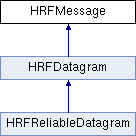Basic message class for HopeRF data transceivers. More...
#include <HRFMessage.h>

Public Member Functions | |
| HRFMessage (HardwareSerial *serial=&Serial) | |
| virtual uint8_t | send (uint8_t *buf, uint8_t len) |
| virtual uint8_t | available () |
| virtual uint8_t | recv (uint8_t *buf, uint8_t *len) |
| virtual uint8_t | rx_bad (void) |
| virtual uint8_t | rx_good (void) |
| virtual void | waitAvailable (void) |
Detailed Description
Basic message class for HopeRF data transceivers.
Define low level unaddressed, unreliable message. HRFMessage have the format LEN payload FCS-LO FCS-HI. LEN is the total number of octets in the message, including the LEN and FCS octets FCS (16 bits) is the complement of CCITT CRC-16 of all octets in the message, including the LEN HRFMessage is unaddressed, and will be received by all HRFMessage nodes within range.
This class and others in this library provide easy methods for sending and receiving messages using the HM-TR. Several layers of classes are provided above this to provide a range of features from unacknowledged broadcasts to acknowledged, reliable addressed messages.
Although HopeRF HM-TR transceivers have an enable pin, this library make no use of that. Enabling and disabling of the transceiver when it is not required should be done by other code.
Although HopeRF HM-TR transceivers have a Config pin, this library make no use of that, since it must be enabled when the transceiver powers up. This librray assumes the transceiver has already been configured, typically using the HopeRF configuration program.
Constructor & Destructor Documentation
| HRFMessage::HRFMessage | ( | HardwareSerial * | serial = &Serial | ) |
You can have multiple instances for HM-TR modules on multiple HardwareSerial ports.
- Parameters
-
[in] serial The instance of HardwareSerial to use for IO. Defaults to &Serial, the Arduino default serial port.
Member Function Documentation
|
virtual |
- Returns
- message length if a complete unread message is available
- 0 (false) if no message is available yet)
Referenced by recv().
|
virtual |
If a message is available (good checksum or not), copies up to *len octets to buf. If a message is copied, *len is set to the length
- Returns
- true if there was a message copied and the FCS checksum was good
- Parameters
-
[in] buf Location to copy the received message [in] len Available space in buf. Set to the actual number of octets copied.
Reimplemented in HRFDatagram.
References available().
Referenced by HRFDatagram::recvfrom().
|
virtual |
The bad message count starts at 0 at instantation time, and is incremented whenever a message with a bad length is received. This generally indicates a corrupt messages.
- Returns
- the number of corrupt messages received.
|
virtual |
The good message count starts at 0 at instantation time, and is incremented whenever a complete message is received,
- Returns
- the number of good messages received.
|
virtual |
Send a message with the given length. Blocks and returns after the entire message has been sent. Any binary data is permitted.
- Parameters
-
[in] buf Pointer to the binary message to send [in] len Number of octets to send
- Returns
- true if the message was transmitted
- false if the message is too long (>HRF_MAX_PAYLOAD)
Referenced by HRFDatagram::sendto().
|
virtual |
Wait until at least 1 octet is available on the serial device On Arduino, polls the device. On Linux, blocks
The documentation for this class was generated from the following files:
- HRFMessage.h
- HRFMessage.cpp
 1.8.2
1.8.2